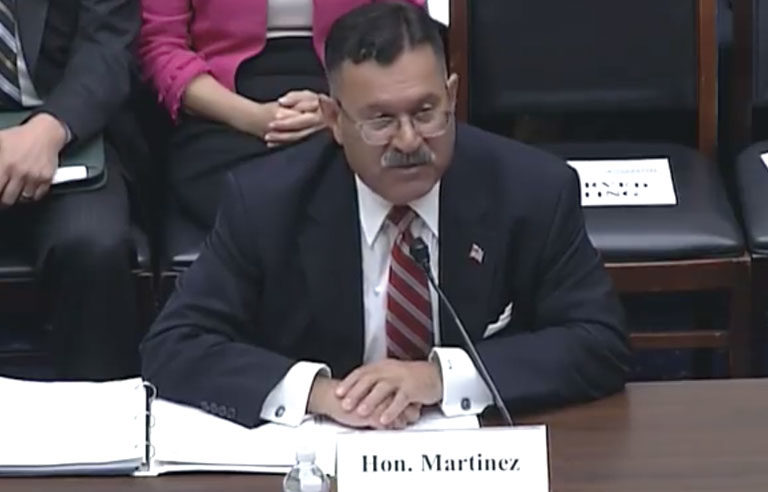FMCSA’s Martinez talks ELDs, driver shortages during House hearing

Washington — Federal Motor Carrier Safety Administration Administrator Raymond Martinez affirmed his belief in electronic logging devices, but said “additional flexibility” is forthcoming for agricultural transporters, during a May 22 hearing before the House Transportation and Infrastructure Committee’s Highways and Transit Subcommittee.
FMCSA has granted two 90-day waivers to livestock and insect haulers, and a House Transportation, Housing and Urban Development appropriations bill for fiscal year 2019 seeks to extend that.
In his opening statement, Martinez indicated that ELDs are here to stay, saying, “Since beginning my tenure with FMCSA in February, we have engaged with our industry and safety partners, working consistently to maintain the safest transportation system possible. One of the ways FMCSA is working toward these goals is helping industry transition to ELDs to address hours-of-service compliance and driver fatigue.”
He added that out of nearly 300,000 driver inspections since the beginning of April, less than 1 percent of drivers “have been cited for failing to have an ELD when they were required to have one.”
Martinez, who was confirmed Feb. 13, also indicated that his agency is looking at flexibility for hours of service. Secretary of Transportation Elaine Chao said in an appropriations hearing April 12 that she has “encouraged legislation” to clarify HOS requirements.
Regarding changes to those requirements, Martinez said, “Let’s look at hours of service and see whether some modifications – that is not extending the hours – but providing some flexibility in the current rules. We are engaging with our stakeholders in the regulated community on this and safety advocates to say what would be acceptable.”
Martinez said proposed changes to the Compliance, Safety, Accountability program were not submitted in December as mandated but are undergoing final review.
“It’s not holding us up in implementing recommendations and moving forward with corrections,” he said.
Pilot program to boost number of interstate CMV drivers to start in 2019
Martinez said a pilot program intended to help expand the pool of interstate commercial motor vehicle drivers will begin early next year.
FMCSA’s pilot program would allow 18- to 21-year-olds who are current or former military members to drive across state lines in CMVs if they have received specific training and are sponsored by a participating motor carrier. A bill introduced by Rep. Claudia Tenney (R-NY) would change the requirements so drivers in that age group must have a valid commercial driver’s license; a driving record free of citations, violations or other safety infractions; and who have completed a training program or similar qualifications.
The program should ease the industry’s driver shortage, Martinez said. However, some industry organizations deny that a driver shortage exists and say changes to current restrictions are unnecessary.
Rep. Duncan Hunter (R-CA), the sponsor of another bill that would establish an apprenticeship program for CDL holders who are younger than 21, asked why drivers who are 18 to 21 can transport goods the roughly 500 miles from San Diego to Sacramento in his state, but cannot go the nearly 500 miles from New York to North Carolina.
“I believe that’s something that deserves exploration,” Martinez said. “Those who have a CDL [are] probably safer than the general population. The problem is the general population of that age group are disproportionately involved in crashes, injuries and fatalities.”
The Owner-Operator Independent Drivers Association, along with 13 other organizations, sent a letter to lawmakers expressing opposition to Hunter’s and Tenney’s bills – both of which at press time were with the Highways and Transit Subcommittee.
Post a comment to this article
Safety+Health welcomes comments that promote respectful dialogue. Please stay on topic. Comments that contain personal attacks, profanity or abusive language – or those aggressively promoting products or services – will be removed. We reserve the right to determine which comments violate our comment policy. (Anonymous comments are welcome; merely skip the “name” field in the comment box. An email address is required but will not be included with your comment.)

